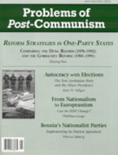
PROBLEMS OF POST-COMMUNISM
Scope & Guideline
Examining the Evolution of Post-Communist Societies
Introduction
Aims and Scopes
- Post-Communist Political Dynamics:
Exploration of political developments, including the emergence of populism, authoritarianism, and democratic transitions in post-communist countries. - Social Movements and Civic Activism:
Analysis of social movements, civic engagement, and the role of activism in shaping political discourse and policy in post-communist contexts. - Historical Memory and Identity Politics:
Investigation into how historical narratives and collective memories influence national identity and political behavior in post-communist societies. - Economic Transition and Governance:
Study of economic reforms, governance practices, and the impact of neoliberal policies on social welfare and inequality in post-communist states. - International Relations and Geopolitics:
Examination of the geopolitical strategies and foreign relations of post-communist countries, particularly in relation to Russia, the EU, and global powers. - Cultural Expressions and Media Representation:
Focus on cultural studies, media analysis, and the representation of social issues in the context of post-communist societies.
Trending and Emerging
- Impact of War and Conflict:
The ongoing consequences of the Russian invasion of Ukraine and other regional conflicts have become a central theme, examining their implications for national identity, political dynamics, and international relations. - Digital Sovereignty and Information Politics:
Emerging discussions around digital sovereignty, media representation, and the impact of technology on civic engagement and political discourse are increasingly prevalent. - Environmental Politics and Climate Change:
There is a growing focus on environmental governance, climate change policies, and their intersection with post-communist political regimes, reflecting global concerns about sustainability. - Gender and Sexuality in Politics:
Research on gendered political dynamics, anti-gender movements, and the role of LGBTQ+ activism in post-communist societies is gaining traction, highlighting the intersection of identity and politics. - Ethnic and Minority Rights:
Increasing attention is being paid to the rights and representation of ethnic minorities, particularly in the context of post-Soviet states, as researchers explore issues of integration and social justice.
Declining or Waning
- Traditional Economic Models:
Research on conventional economic models and theories specific to post-communist economies has decreased, possibly due to a shift towards more contemporary issues such as digital economies and environmental challenges. - Simplistic Views of Political Transition:
The narrative of straightforward democratic transitions post-communism is less prevalent, as the complexities of hybrid regimes and authoritarian resilience have taken precedence. - Static Historical Narratives:
There is a waning interest in static historical narratives that do not engage with contemporary implications or the evolving nature of memory politics in the region. - Uniform Approaches to Civil Society:
The exploration of civil society has shifted from uniform approaches to more nuanced studies that consider diverse forms of activism and dissent in various contexts. - Overemphasis on Nationalism:
While nationalism remains a relevant topic, there is less focus on its simplistic or monolithic representations, reflecting a more complex understanding of identity politics.
Similar Journals

OSTEUROPA
Advancing Scholarship on Eastern European AffairsOSTEUROPA is a distinguished academic journal dedicated to the examination and analysis of social, cultural, and political developments in Eastern Europe. Published by BWV-BERLINER WISSENSCHAFTS-VERLAG GMBH, this journal has been a critical voice in the field since its inception in the mid-20th century, notably converging from various years to establish a comprehensive discourse on the dynamics shaping the region. With an ISSN of 0030-6428 and an E-ISSN of 2509-3444, OSTEUROPA taps into the expansive fields of sociology and political science, holding a reputable Q3 category ranking in these disciplines for 2023. While not currently an open access publication, it remains a vital platform for researchers, professionals, and students alike who seek to deepen their understanding of Eastern European affairs. The journal also ranks in the 17th percentile within the Scopus listings, underscoring its role as a significant, albeit niche, contributor to social studies and political science scholarship. Addressed from its base in vibrant Berlin, OSTEUROPA continues to foster intellectual dialogue and provide valuable insights into the complexities of Eastern European societies.

COMMUNIST AND POST-COMMUNIST STUDIES
Unraveling the Threads of History in Communist and Post-Communist StudiesCommunist and Post-Communist Studies, published by University of California Press, is a leading interdisciplinary journal that delves into the complexities of communist and post-communist societies. With an ISSN of 0967-067X and E-ISSN 1873-6920, the journal has been a crucial platform for scholarly dialogue since its inception in 1993. Covering a broad spectrum of topics within the realms of Development and Sociology and Political Science, its status as a Q2 journal in both categories reflects the rigor and relevance of the research it publishes. With impressive Scopus rankings—#544 out of 1466 in Sociology and Political Science and #162 out of 306 in Development—the journal is positioned as a vital resource for academics, practitioners, and students interested in the socio-political transformations in Eastern Europe and beyond. Although it is not an open-access journal, it remains committed to disseminating high-quality research that addresses the evolving dynamics of post-communist societies into 2024 and serves as an essential tool for understanding contemporary global issues.

Romanian Journal of Political Science
Bridging National Insights with Global PerspectivesThe Romanian Journal of Political Science, published by the Romanian Academy of Sciences, is a vital resource for researchers, professionals, and students interested in the fields of political science and international relations. This journal, carrying the ISSN 1582-456X, has established itself within the academic community through its focus on contemporary issues and innovative research methodologies. Although its coverage in Scopus was discontinued after 2022, the journal remains a significant contributor to discussions surrounding political dynamics in Romania and beyond, classified in the Q4 category for both political science and sociology as of 2023. With a national focus and international relevance, it offers insights into regional political contexts and societal transformations, making it an essential reading for anyone looking to deepen their understanding of these disciplines. The journal is dedicated to promoting rigorous scholarly work and fostering an engaging platform for interdisciplinary dialogue.

Temas y Debates
Empowering Research, Enriching Global PerspectivesTemas y Debates is a distinguished academic journal dedicated to the exploration of political science and international relations, published by the esteemed Universidad Nacional de Rosario, Faculty of Political Science and International Relations. With its commitment to open access since 2007, this journal strives to disseminate valuable knowledge widely, ensuring that research is accessible to all, fostering a culture of transparency and collaboration within the academic community. Aiming to contribute significantly to the dialogue in political and social issues, Temas y Debates provides a platform for scholarly articles that delve into contemporary debates and analyses relevant to Latin America and beyond. Despite the absence of a specific HIndex, its dedication to high-quality research makes it a vital resource for researchers, professionals, and students alike, who are eager to stay informed about the latest trends and discussions in the field.
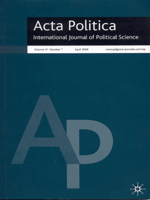
Acta Politica
Shaping the Future of Political ScienceActa Politica, published by Palgrave Macmillan Ltd, is a distinguished academic journal in the field of Political Science and International Relations. With a robust impact factor and ranking in the top quartile (Q1) of its category for 2023, this journal serves as a vital resource for scholars and practitioners alike, fostering significant discourse on contemporary political issues. The journal is indexed in Scopus, where it holds a commendable rank of 180 out of 706 in its field, placing it in the 74th percentile, thus underscoring its importance and influence. Acta Politica is dedicated to the exploration of political theory, comparative politics, and international studies from 2006 to 2024, making it an essential avenue for innovative research. While the journal does not currently offer open access, the comprehensive and peer-reviewed articles featured within are invaluable for those seeking to deepen their understanding of complex political dynamics. Located in the United Kingdom, Acta Politica appeals to a global audience of researchers, professionals, and students interested in shaping the future of political science.
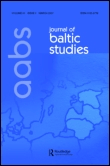
JOURNAL OF BALTIC STUDIES
Connecting Scholars to the Vibrant Baltic NarrativeJOURNAL OF BALTIC STUDIES, published by the Association for the Advancement of Baltic Studies Inc, is a distinguished academic journal dedicated to the interdisciplinary exploration of cultural, historical, and sociopolitical issues relating to the Baltic region. With an ISSN of 0162-9778 and an E-ISSN of 1751-7877, this journal plays a pivotal role in disseminating innovative research and critical analyses across various facets of arts and humanities. Holding a notable impact factor with rankings such as Q2 in Arts and Humanities (miscellaneous) and Q1 in Cultural Studies in 2023, it exemplifies academic excellence and relevance. Researchers, professionals, and students engaging in Baltic studies will find a wealth of insightful articles as the journal maintains a convergence period from 1972 to 2001 and continues its contributions through 2024. As a valuable resource for advancing understanding and fostering scholarship in the Baltic domain, the JOURNAL OF BALTIC STUDIES invites its audience to delve into a rich array of scholarly work that reflects the complexities and dynamism of the region.
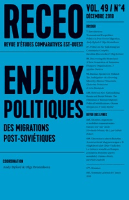
REVUE D ETUDES COMPARATIVES EST-OUEST
Advancing Knowledge: Critical Perspectives on Global InteractionsREVUE D ETUDES COMPARATIVES EST-OUEST is a distinguished academic journal published by PRESSES UNIV FRANCE, dedicated to the critical exploration of comparative studies in the social sciences, particularly focused on Finance and Political Science. Operating since its inception in 1978, this journal has evolved into an essential resource for researchers examining the dynamics between Eastern and Western paradigms, offering insights that bridge regional perspectives. Although it holds a Q4 classification in both Finance and Political Science and International Relations categories for 2023, it serves as a platform for emerging voices and established scholars alike to publish meaningful research. With Scopus rankings placing it within the 33rd percentile for Political Science and 13th percentile for Finance, the journal continues to foster scholarly dialogue and encourages submissions that contribute to the broader understanding of comparative analysis. While currently not an open-access journal, it provides a valuable forum for innovative research that can significantly impact both academic and policy-making communities. This makes REVUE D ETUDES COMPARATIVES EST-OUEST an important journal for anyone looking to deepen their understanding of international relationships and economic interactions.
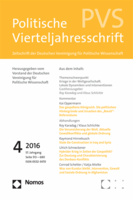
POLITISCHE VIERTELJAHRESSCHRIFT
Bridging Theory and Practice in Political DiscoursePOLITISCHE VIERTELJAHRESSCHRIFT, published by SPRINGER, is a leading academic journal in the fields of sociology and political science, esteemed for its rigorous peer-reviewed articles and impactful research contributions. With an ISSN of 0032-3470 and an E-ISSN of 1862-2860, this journal enjoys a prominent reputation, categorized in the Q2 quartile as of 2023, ranking #454 out of 1466 in Scopus for social sciences. The journal's scope covers a broad range of topics, including political theory, public policy, and social movements, making it a vital resource for researchers, professionals, and students alike. It is published in Germany and features scholarly articles that bridge theoretical frameworks with empirical studies, fostering a deeper understanding of contemporary political phenomena. Although it currently does not offer open access, its publications are available through various academic libraries and databases, ensuring that its critical insights reach an extensive audience. Join the discourse in political science and sociology through the profound analyses presented in each quarterly issue, which has been converging since 1987, providing invaluable perspectives that contribute to the evolving landscape of social sciences.
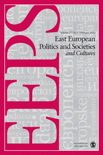
EAST EUROPEAN POLITICS AND SOCIETIES
Fostering scholarly exchange on the evolution of Eastern Europe.EAST EUROPEAN POLITICS AND SOCIETIES, published by SAGE Publications Inc, stands as a vital academic resource within the fields of sociology and political science, focusing primarily on the dynamics and transformations of Eastern Europe. With an ISSN of 0888-3254 and an E-ISSN of 1533-8371, this quarterly journal has been contributing to scholarly discourse since 1986 and continues to be a crucial platform for the exchange of innovative research and critical insights, boasting a commendable Q2 ranking in its category as of 2023. Researchers, professionals, and students engaged in the exploration of post-socialist transitions, identity politics, and socio-economic challenges will find this journal an essential tool for understanding the complexities of the region. While the journal offers limited open access options, its presence in academic databases ensures that cutting-edge research remains accessible to a broader audience. With a Scopus rank of #606 out of 1466 in the social sciences category, EAST EUROPEAN POLITICS AND SOCIETIES continues to shape the intellectual landscape and discourse surrounding Eastern Europe.

International Journal of Politics Culture and Society
Navigating the Nexus of Politics, Culture, and SocietyThe International Journal of Politics Culture and Society, published by SPRINGER, serves as a premier platform for scholarly dialogue across the fields of political science, sociology, and cultural studies. With an ISSN of 0891-4486 and an E-ISSN of 1573-3416, this journal has successfully published rigorous research since its inception in 1987. It features a convergence of critical ideas and empirical studies that explore the intersection of political, cultural, and social dynamics globally. Ranked in the Q2 category for both Political Science and International Relations and Sociology by prestigious metrics, this journal reflects its high impact within the academic community, showcasing articles that hold significant relevance across disciplines. Additionally, it maintains commendable Scopus rankings, placing it in the 76th and 71st percentiles within its respective categories. While this journal operates under a subscription model, it remains committed to facilitating access to important research for professionals, researchers, and students eager to engage with contemporary political and social issues.